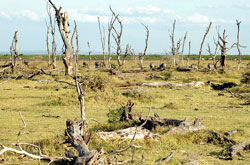 Our political systems and global politics are largely unequipped for the real challenges of today's world. Global economic growth and rising populations are putting unprecedented stresses on the physical environment, which in turn creates extraordinary social challenges. But politicians are largely ignorant of these trends and governments aren't organised to meet them. Crises that are fundamentally ecological in nature are managed by outdated strategies of war and diplomacy.
Our political systems and global politics are largely unequipped for the real challenges of today's world. Global economic growth and rising populations are putting unprecedented stresses on the physical environment, which in turn creates extraordinary social challenges. But politicians are largely ignorant of these trends and governments aren't organised to meet them. Crises that are fundamentally ecological in nature are managed by outdated strategies of war and diplomacy.
Consider Darfur, Sudan. This horrible conflict is being addressed through threats of military force, sanctions, and the language of war and peacekeeping. Yet the origin of the conflict is the region's extreme poverty, made disastrously worse in the 1980s by a drought that has essentially lasted until today. It appears that long-term climate change is leading to lower rainfall not only in Sudan, but also in much of Africa south of the Sahara, where life depends on the rains, and drought means death.
Nobody approaches Darfur's drought-induced death-trap from the perspective of long term development. Darfur needs a water strategy more than a military strategy. Yet all the talk at the United Nations is about sanctions and armies, with no path to peace in sight.
Water stress is a major obstacle to economic development in many countries. China and India will face growing water crises in the coming years, with potentially horrendous consequences. The economic takeoff of these two giants started 40 years ago with higher agricultural output and an end to famines. Yet part of that increased agricultural output resulted from millions of wells sunk to tap underground water supplies for irrigation. Now the water table is falling dangerously fast, as underground water is being pumped much faster than the rains can recharge it.
Aside from rainfall patterns, climate change is upsetting the flow of rivers, as glaciers, which provide a huge amount of water for irrigation and household use, rapidly recede due to global warming. Snow pack in the mountains is melting earlier in the season, so river water is less available during summer growing seasons.
Given the heat waves, droughts, and other climate stresses across the US, Europe, Australia, and elsewhere this year, wheat prices are shooting to their highest levels in decades. With rising populations, economic growth, and climate change, we will face intensifying droughts, hurricanes and typhoons, El Ni?os, water stress, heat waves, species extinction, and more.
Environment and climate issues will be the hard, strategic concerns of the 21st century. Yet people who speak about hunger and environmental crises are viewed as muddle-headed moralists, as opposed to hard-headed realists who deal with war and peace. This is nonsense. The so-called realists don't understand the sources of tensions and stresses that are causing crises around the world.
Governments should establish Ministries of Sustainable Development, to manage the links between environmental change and human well-being. Agriculture ministers by themselves can't cope with water shortages that farmers will face. Health ministers won't be able to cope with an increase in infectious diseases due to global warming or environment ministers with the pressures on oceans and forests. A new powerful ministry should be charged with coordinating the responses to climate change, water stress, and other ecosystem crises.
The treaties governments have signed in recent years on climate, environment, and biodiversity are as important to global security as the war zones and crisis hotspots that grab the headlines, budgets, and attention.
By focusing on the underlying challenges of sustainable development, ourgovernments could more easily end current crises, as in Darfur, and head off many more in the future.
Jeffrey Sachs is professor of economics and Director of the Earth Institute at
Columbia University.



